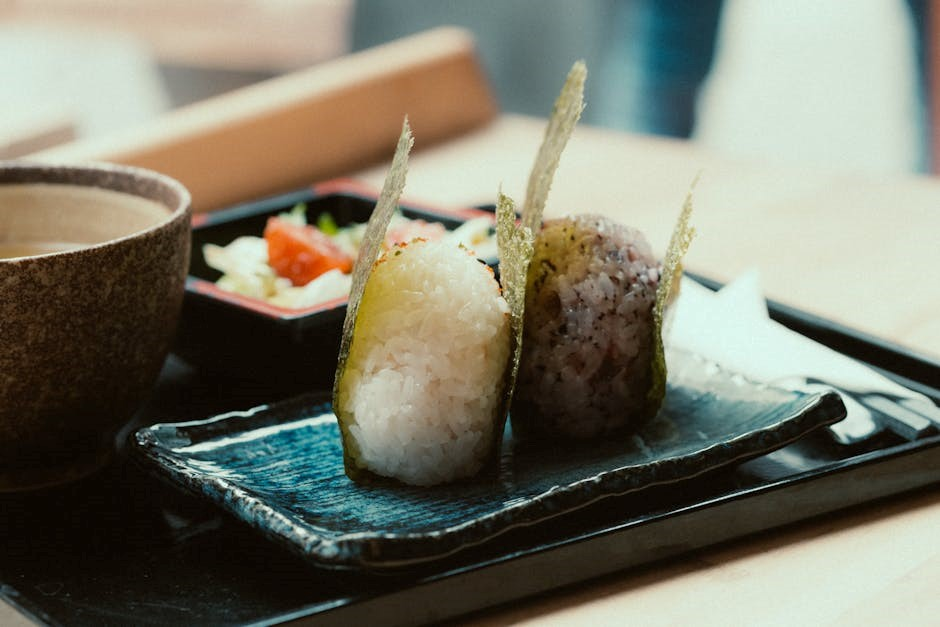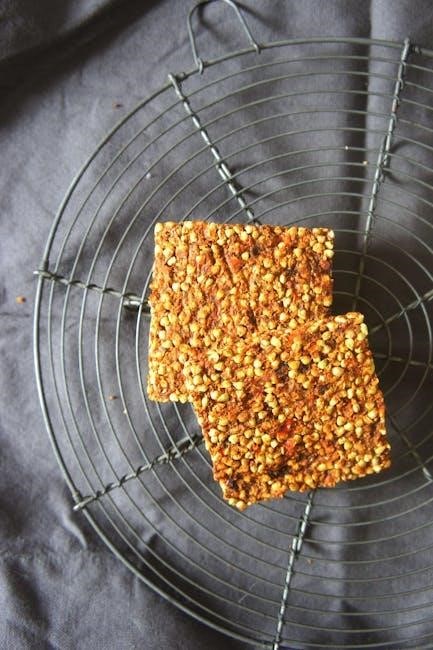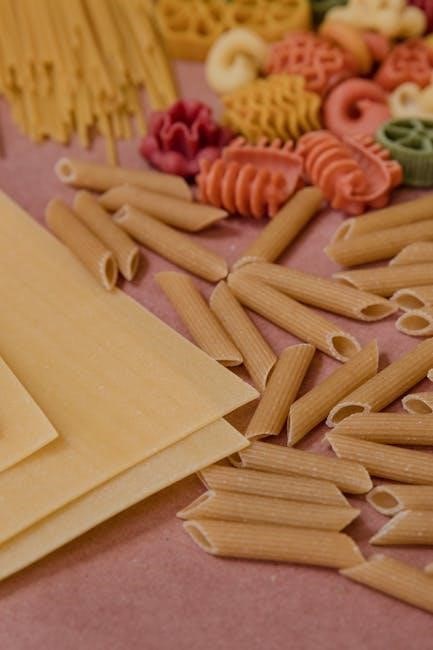This guide provides essential dietary recommendations for managing gallstones effectively. It focuses on a low-fat, balanced diet to alleviate symptoms and support overall digestive health, helping individuals make informed food choices to prevent complications and improve well-being.
What Are Gallstones?
Gallstones are small, hard deposits that form inside the gallbladder, a organ that stores bile to aid in fat digestion. They are typically composed of cholesterol, bilirubin, or a combination of these substances. Gallstones can range in size from tiny grains of sand to large pearls and may cause severe abdominal pain, especially after eating fatty or heavy meals.
The gallbladder plays a crucial role in digestion by storing and releasing bile, a fluid produced by the liver. When bile contains too much cholesterol or bilirubin, or if the gallbladder doesn’t empty properly, gallstones can develop. Risk factors include obesity, rapid weight loss, a high-fat diet, and certain medical conditions.
Symptoms of gallstones may include sharp pain in the upper right abdomen, nausea, vomiting, and bloating. In some cases, gallstones may not cause any symptoms, but they can still lead to complications like blockages or inflammation. Understanding gallstones is essential for managing their impact and implementing dietary changes to reduce discomfort and prevent recurrence.

Dietary Recommendations for Gallstones
A low-fat, balanced diet is key to managing gallstones. Focus on plenty of fruits, vegetables, and whole grains to support digestion and reduce symptoms. Avoid trigger foods and stay hydrated to promote overall gallbladder health and prevent complications.
Foods to Eat with Gallstones
A healthy, balanced diet rich in fiber and low in fat can help manage gallstone symptoms. Include plenty of fruits and vegetables, such as citrus fruits, dark leafy greens, and tomatoes, which support digestion and overall health. Whole grains like bread, rice, cereals, and pasta provide sustained energy and fiber. Lean proteins, such as poultry, fish, and plant-based options, are beneficial. Healthy fats, like those found in avocado, nuts, and olive oil, should be consumed in moderation to support bile function without overloading the gallbladder. Low-fat dairy products, such as skimmed milk and low-fat cheese, are also recommended. Additionally, staying hydrated by drinking plenty of water helps flush out toxins and supports digestive function. Avoid trigger foods that cause discomfort, as these can vary for each individual. Portion control and gradual weight loss, if needed, can further reduce the risk of complications. By focusing on nutrient-dense foods, you can alleviate symptoms and support your gallbladder’s function effectively.
Foods to Avoid with Gallstones
When managing gallstones, certain foods can trigger symptoms and should be avoided. Foods high in saturated and trans fats, such as fried foods, processed meats, and full-fat dairy products, can worsen discomfort. Red and processed meats, like sausages and bacon, should be limited due to their high fat content. Eggs, particularly yolks, and fatty cuts of beef, pork, and lamb can also exacerbate symptoms. Avoid creamy soups, sauces, and gravies, as they are typically high in fat. Certain vegetables, such as beans, Brussels sprouts, cabbage, broccoli, and onions, may trigger pain in some individuals. Additionally, foods high in cholesterol, like egg yolks, should be consumed in moderation. Sugary and refined carbohydrate-rich foods, such as pastries and white bread, can contribute to weight gain, increasing gallstone risk. It’s important to identify and avoid any specific foods that personally trigger discomfort. By eliminating these triggers and focusing on a balanced, low-fat diet, individuals can better manage their condition and reduce the risk of complications. Always consult a healthcare professional for personalized dietary advice.

Benefits of a Gallstones Diet
A gallstones diet helps reduce symptoms like pain, improves digestion, and prevents gallstone recurrence. It supports weight management and overall well-being by promoting a balanced intake of nutrients and limiting fat intake effectively.
Managing Symptoms
A well-planned diet plays a crucial role in managing gallstone symptoms. By reducing fat intake, individuals can minimize gallbladder stimulation, which often triggers pain. Incorporating plenty of fruits, vegetables, and whole grains helps maintain a healthy digestive system. Avoiding fatty or greasy foods, such as fried items and high-fat dairy, can reduce discomfort. Lean proteins like poultry, fish, and legumes are excellent alternatives. Small, frequent meals instead of large ones can ease digestion and prevent gallbladder strain. Staying hydrated and limiting caffeine and alcohol may also alleviate symptoms. Identifying and avoiding specific trigger foods that cause pain is essential for personalized management. While diet changes can help control symptoms, they may not eliminate them entirely, so medical evaluation remains important for persistent issues. A structured dietary approach not only alleviates discomfort but also supports overall health and well-being.
Weight Management

Maintaining a healthy weight is crucial for managing gallstones, as excess weight increases the risk of developing them. A balanced, low-fat diet helps regulate weight while reducing gallbladder strain. Incorporate plenty of fruits, vegetables, and whole grains to provide essential nutrients and fiber, which support digestion and satiety. Avoid high-fat, high-calorie foods like fried items, processed snacks, and sugary treats that contribute to weight gain. Portion control is key to prevent overeating and promote steady digestion. Regular, smaller meals can help avoid putting extra pressure on the gallbladder. Lean proteins, such as poultry, fish, and legumes, are excellent choices for balanced nutrition. Healthy fats, like those in avocados and nuts, should be consumed in moderation to avoid overloading the digestive system. Aim for gradual weight loss of about 0.5 to 1 kg per week to minimize the risk of gallstone formation. Combining dietary changes with regular physical activity enhances weight management and overall health. Always consult a healthcare professional for personalized advice, especially if significant weight loss is needed.

Preventing Gallstone Recurrence

A healthy diet plays a significant role in preventing the recurrence of gallstones. Focus on consuming a balanced, low-fat diet rich in fiber to support digestion and bile function. Include plenty of fruits, vegetables, and whole grains, as they help regulate cholesterol and bilirubin levels, key contributors to gallstone formation. Stay hydrated to ensure bile remains thin and flows smoothly. Avoid excessive dietary cholesterol and saturated fats, which can increase gallstone risk. Incorporate lean proteins like poultry, fish, and plant-based options, and opt for healthy fats such as avocados and nuts in moderation. Avoid rapid weight loss, as it can increase the risk of developing new gallstones. Instead, aim for gradual weight changes through a sustainable diet and regular physical activity. Eating smaller, frequent meals can also help prevent gallbladder stasis. Limit foods that trigger symptoms, such as fatty or fried foods, and consider including foods high in antioxidants, like citrus fruits and dark leafy greens. By adhering to these dietary principles, you can significantly reduce the likelihood of gallstone recurrence and maintain long-term digestive health.

Post-Cholecystectomy Diet
After gallbladder removal, dietary adjustments are essential to manage digestion effectively. Since the gallbladder is no longer present to store and release bile, fat digestion may be less efficient. A post-cholecystectomy diet focuses on minimizing discomfort and ensuring proper nutrient absorption. It is recommended to opt for low-fat or fat-free foods, as high-fat meals can cause diarrhea or bloating. Choose lean proteins like poultry, fish, and plant-based options, and prioritize whole, unprocessed foods such as fruits, vegetables, and whole grains. Avoid trigger foods that can cause digestive issues, such as fried foods, heavy cream, or high-fat dairy products. Staying hydrated is crucial to help bile flow naturally. Some individuals may benefit from bile salt supplements to aid fat digestion, but this should be discussed with a healthcare provider. Incorporate smaller, more frequent meals to ease digestion and reduce symptoms. Over time, most people can return to a normal diet, but it’s important to listen to your body and make gradual adjustments. A balanced and mindful eating approach will help maintain digestive health after gallbladder removal.
